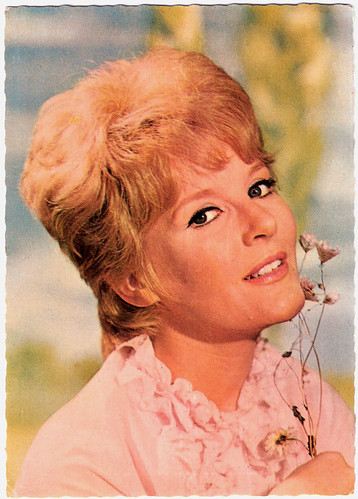
French postcard by Publistar, Marseille, no. 885. Photo: Nisak / Vogue.
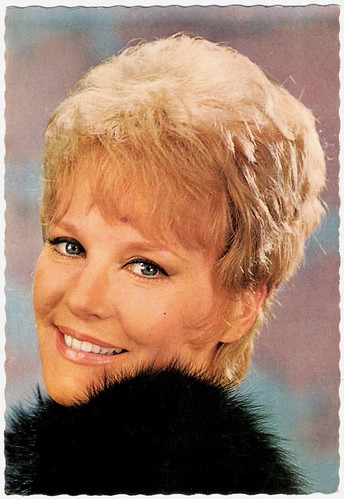
French postcard by Publistar, Marseille, no. 886. Photo: Nisak / Vogue.
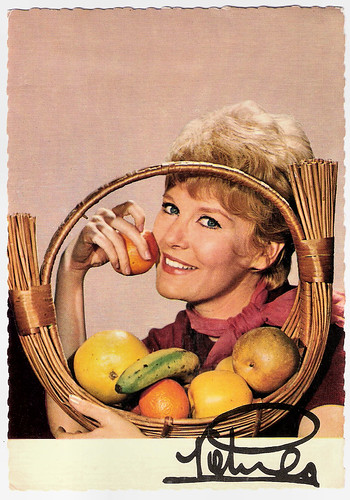
French postcard by Editions Starama, no. S-817. Photo: Disque Vogue.
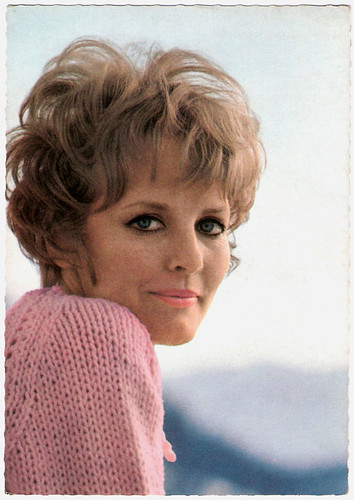
German postcard by ISV, no. 136.
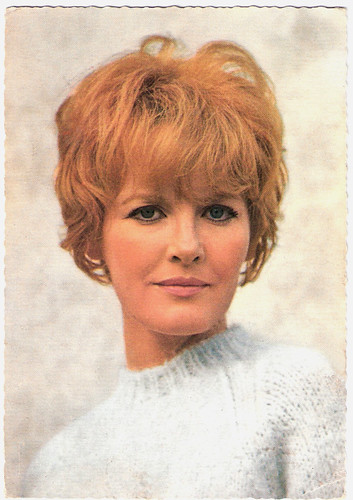
French postcard by PSG, no 1129. Offered by Korès.
Britain's Shirley Temple
Petula Sally Olwen Clark was born in Epsom, Great Britain in 1932, to an English father, Leslie Norman Clark, and a Welsh mother Doris Clark-Phillips, who were both nurses at Long Grove Hospital in Epsom. As a child, Petula sang in the chapel choir. In 1942, she made her radio debut while attending a BBC broadcast with her father, hoping to send a message to an uncle stationed overseas. During an air raid, the producer requested that someone perform to settle the jittery audience.
Clark volunteered a rendition of Mighty Lak a Rose to an enthusiastic response in the theatre. She then repeated her performance for the broadcast audience, launching a series of some 500 appearances in programmes to entertain the troops. In addition to this radio work, Clark frequently toured the UK with fellow child performer Julie Andrews. 'Britain's Shirley Temple' was considered a mascot by the RAF. In 1944, while performing at London's Royal Albert Hall, Clark was discovered by film director Maurice Elvey.
Elvey cast her as an orphaned waif in his weepy war drama Medal for the General (1944). In quick succession, she starred in Strawberry Roan (Maurice Elvey, 1945) and I Know Where I'm Going! (Michael Powell, Emeric Pressburger, 1945) starring Wendy Hiller.
Then followed London Town (Wesley Ruggles, 1946), and Here Come the Huggetts (Ken Annakin, 1948), the first in a series of Huggett Family films based on a British radio series. Although most of the other 24 films she made during the 1940s and 1950s were B-films, she did work with Anthony Newley in Vice Versa (Peter Ustinov, 1948) and Alec Guinness in The Card (Ronald Neame, 1952).
In 1946, she launched her television career with an appearance on a BBC variety show, Cabaret Cartoons, which led to her being signed to host her own afternoon series, titled Petula Clark. A second, Pet's Parlour, followed in 1949. In later years, she starred in This is Petula Clark (1966-1967) and The Sound of Petula (1972-1974).
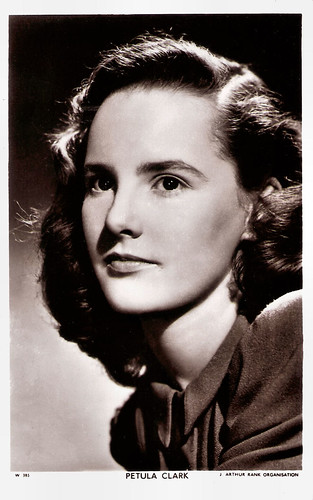
British postcard in the Picturegoer Series, London, no. W 385. Photo: J. Arthur Rank Organisation.
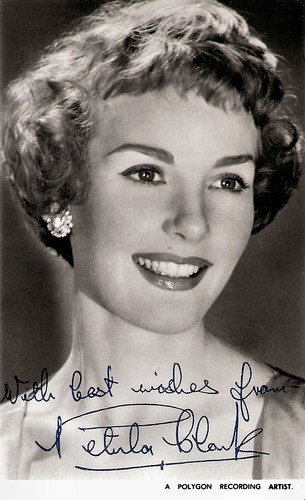
British autograph card by Polygon. Photo: John Vickers.
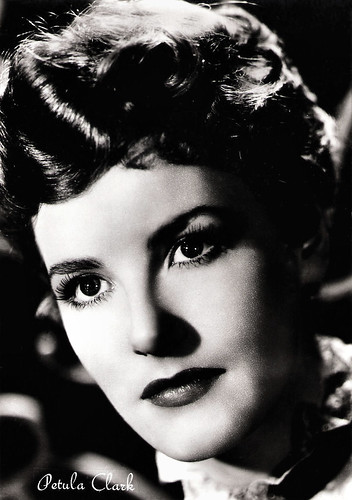
Italian postcard by Rotalfoto, Milano, no. 129. Photo: Rank Film. Publicity still for The Card (Ronald Neame, 1952).
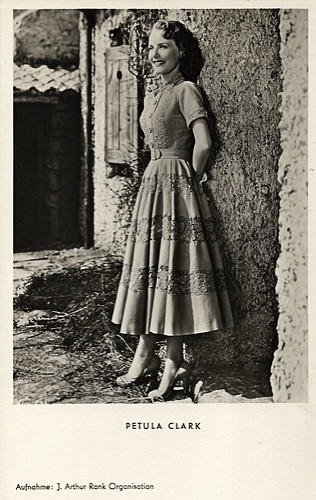
German postcard by Kunst und Bild, Berlin, no. A 776. Photo: J. Arthur Rank. Publicity still for Made in Heaven (John Paddy Carstairs, 1952).
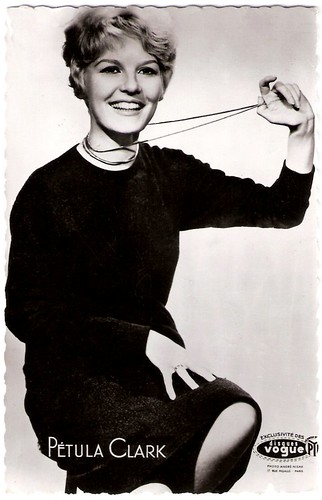
Dutch postcard, sent by mail in 1965. Photo: Vogue.
Mr. Piano
In 1949, Petula Clark recorded her first songs 'Music, Music, Music' and 'Put Your Shoes On, Lucy'. Because neither EMI nor Decca, for whom she had recorded, were keen to sign her to a long-term contract, Clark's father teamed with Alan A. Freeman to form their own label, Polygon Records. She scored a number of major hits in the UK during the 1950s, including 'The Little Shoemaker' (1954), 'Majorca' (1955), 'Suddenly There's a Valley' (1955) and 'With All My Heart' (1956).
It was around 1955 that Clark became romantically linked with Joe 'Mr Piano' Henderson. Their relationship lasted a couple of years, professionally culminating in a BBC Radio series in which they performed together. Near the end of 1955, Polygon Records was sold to Pye Records, for whom she would record for the remainder of the 1950s, throughout the 1960s and early into the 1970s. In 1958, Clark was invited to appear at the Olympia in Paris where, despite her misgivings, she was received with acclaim.
At the office of Vogue Records, she met publicist Claude Wolff, to whom she was attracted, and when told he would work with her if she signed with the label, she agreed. Her initial French recordings were huge successes. Gradually she moved further into the continent, recording in German, French, Italian and Spanish, and establishing herself as a multi-lingual performer. In 1961, Clark married Wolff. Wanting to escape the strictures of child stardom imposed upon her by the British public, and anxious to escape the influence of her father, she relocated to France, where she and Wolff had two daughters, Barbara Michelle and Katherine Natalie. Their son Patrick was born in 1972.
While she focused on her new career in France, she continued to achieve hit records in the UK into the early 1960s, developing a parallel career on both sides of the Channel. Her 1961 recording of 'Sailor' became her first #1 hit in the UK. In France, 'Ya Ya Twist' (the only successful recording of a twist song by a female) and 'Chariot' (the original version of 'I Will Follow Him') became smash hits in 1962.
Released in four different languages in late 1964, 'Downtown' was a success in the UK, France, Netherlands, Germany, Australia, Italy, and even in Rhodesia, Japan, and India, and it went to #1 on the US charts in January 1965. It was the first of fifteen consecutive Top 40 hits Clark scored in the USA, including 'I Know a Place', 'A Sign of the Times', 'I Couldn't Live Without Your Love', 'This Is My Song', and 'Don't Sleep in the Subway'. She was honoured with Grammy Awards for 'Downtown' in 1964 and for 'I Know a Place' in 1965. In 2003, 'Downtown' was inducted into the Grammy Hall of Fame.
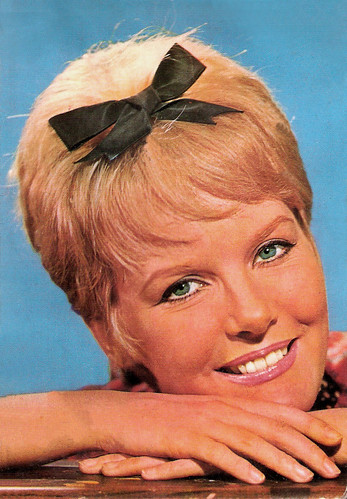
French postcard by E.P.M.B., no. 767. Photo: Vogue.
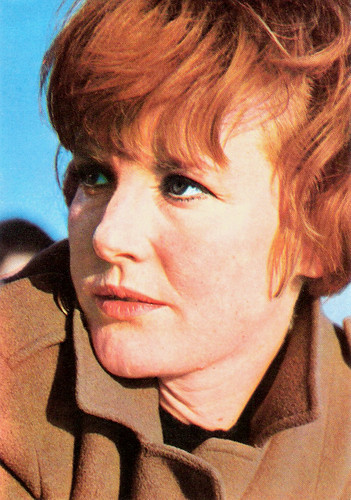
Italian postcard Photo: SAAR.
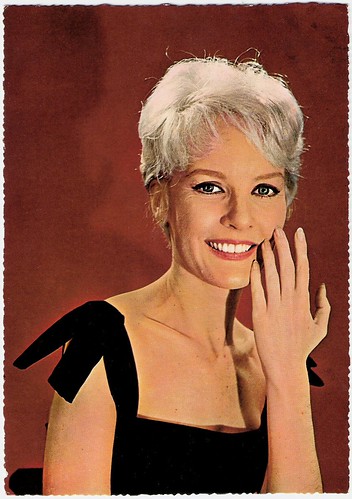
Belgian postcard by Uitg. Best (SB), Antwerpen.
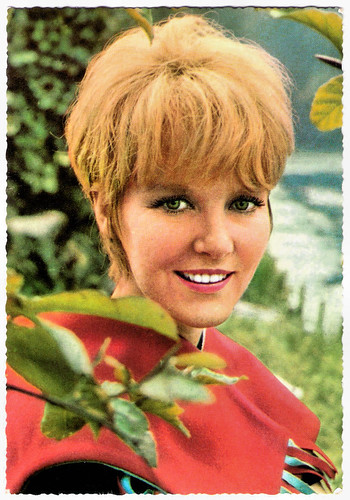
German postcard by Krüger, no. 902/264. Photo: Neuvecelle.

German postcard by Krüger, posted by mail in 1965. Photo: Pierre Spitzer.
Maria von Trapp
In 1964, Petula Clark wrote the musical score for the French crime caper A Couteaux Tirés/Daggers Drawn (Charles Gérard, 1964) and also played a cameo in it as herself. Although it was only a mild success, it added a new dimension — that of a film composer — to her career. In 1968, NBC invited Clark to host her own special in the US, and in doing so she inadvertently made television history. While singing a duet of On the Path of Glory, an anti-war song she had composed, with guest Harry Belafonte, she touched his arm, to the dismay of a representative from Chrysler, the show's sponsor, who feared the brief moment would offend Southern viewers at a time when racial conflict was still a major issue in the US.
When he insisted they substitute a different take, with Clark and Belafonte standing well away from each other, she and her husband Wolff, producer of the show, refused, destroyed all other takes of the song, and delivered the finished program to NBC with the touch intact. It aired to high ratings and critical acclaim and marked the first time a man and woman of different races exchanged physical contact on American television.
Throughout the 1960s and 1970s, Clark toured in concert extensively throughout the States. She revived her film career, starring in two big musical films: Finian's Rainbow (Francis Ford Coppola, 1968) opposite Fred Astaire for which she was nominated for a Best Actress Golden Globe Award, and Goodbye, Mr. Chips (Herbert Ross, 1969) with Peter O'Toole.
After this, her output of hits in the States diminished markedly, although she continued to record and make television appearances into the 1970s. By the mid-1970s, she scaled back her career to devote more time to her family. Her last film to date is the British production Never Never Land (Paul Annett, 1980). In 1981, at the urging of her children, she returned to legitimate theatre, starring as Maria von Trapp in 'The Sound of Music' in London's West End. Opening to rave reviews and what was then the largest advance sale in British theatre history, Clark extended her initial six-month run to thirteen to accommodate the huge demand for tickets.
In 1983, she took on the title role in George Bernard Shaw's 'Candida'. Later stage work included 'Someone Like You' (1989-1990), for which she also composed the score; her Broadway debut 'Blood Brothers' (1993), and 'Sunset Boulevard' (1995-2000), appearing in both the West End and US touring productions. In 1998, Clark was made a CBE (Commander of the Order of the British Empire). With more than 68 million records sold worldwide, she is the most successful British female solo recording artist and is cited as such in the Guinness Book of World Records.

French postcard by Editions P.I., Paris, no. 1107. Photo: Ektachrome Kasparian.
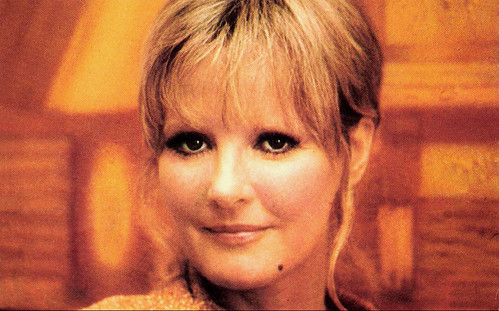
French postcard offered by Corvisart, Épinal, no. 1505.
Scene from the first Huggett film, Here Come The Huggetts (1948). Source: Little Shoemaker (YouTube).
Scene from Finian's Rainbow (1968). Source: M1ckeyJoe (YouTube).
Sources: Petula Clark.net, PetulaClark.co.uk, Wikipedia, and IMDb.
This post was last updated on 28 September 2023.
1 comment:
I know very well this English singer.
she had a great carrer in France.
Post a Comment